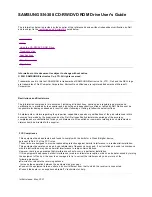
Geo MACRO Drive User Manual
46
Software Setup
I76=$3333
; Enabled for MACRO IC 3, Nodes 0,1,4,5,8,9,12,13
I71/I73/I75/I77: MACRO IC 0/1/2/3 Node Protocol Type Control
I71, I73, I75, and I77 are 16-bit I-variables (bits 0 - 15) in which each bit controls whether PMAC uses
the uses MACRO Type 0 protocol or the MACRO Type 1 protocol for the node whose number matches
the bit number for the purposes of the auxiliary servo flag transfer for MACRO ICs 0, 1, 2, and 3,
respectively. A bit value of 0 sets a Type 0 protocol; a bit value of 1 sets a Type 1 protocol.
All 3U MACRO Station nodes use the Type 1 protocol, so each MACRO node
n
used for servo purposes
with a MACRO Station must have bit
n
of I1002 set to 1. Generally I71 = I70, I73 = I72, I75 = I74, and
I77 = I76 on a Turbo PMAC2 communicating with a MACRO Station.
Remember that if servo nodes for more than one MACRO Station are commanded from a single MACRO
IC, the protocol must be selected for all of the active servo nodes on each station.
I78: MACRO Master/Slave Auxiliary Communications Timeout
If I78 is set greater than 0, the MACRO Type 1 Master/Slave Auxiliary Communications protocol using
Node 15 is enabled. Turbo PMAC implements this communications protocol using the
MACROSLAVE
(
MS
),
MACROSLVREAD
(
MSR
), and
MACROSLVWRITE
(
MSW
) commands.
If this function is enabled, I78 sets the timeout value in PMAC servo cycles. In this case, if PMAC does
not get a response to a Node 15 auxiliary communications command within I78 servo cycles, it will stop
waiting and register a MACRO auxiliary communications error, setting Bit 5 of global status register
X:$000006.
I78 must be set greater than 0 if any auxiliary communications is desired with a MACRO Station. This
reserves Node 15 for the Type 1 Auxiliary Communications. A value of 32 is suggested. If I78 is set
greater than 0, bit 15 of I70, I72, I74, and I76 must be set to 0, so Node 15 is not used for flag transfers also.
I79: MACRO Master/Master Auxiliary Communications Timeout
If I79 is set greater than 0, the MACRO Type 1 Master/Master Auxiliary Communications protocol using
Node 14 is enabled. Turbo PMAC implements this communications protocol using the
MACROMASTER
(
MM
),
MACROMSTREAD
(
MMR
), and
MACROMSTWRITE
(
MMW
) commands. Only the Turbo PMAC that is
the “ring controller” can execute these commands; other Turbo PMACs that are masters on the ring can
respond to these commands from the ring controller.
If this function is enabled, I79 sets the “timeout” value in PMAC servo cycles. In this case, if the Turbo
PMAC does not get a response to a Node 14 master/master auxiliary communications command within
I79 servo cycles, it will stop waiting and register a “MACRO auxiliary communications error,” setting Bit
5 of global status register X:$000006.
I79 must be set greater than 0 if any auxiliary communications is desired with a MACRO Station. A
value of 32 is suggested. If a value of I79 greater than 0 has been saved into PMAC’s non-volatile
memory, then at subsequent power-up/resets, bit 14 of I70 is set to 0, the node-14 broadcast bit (bit 14 of
I6840) is set to 1, and activation bit for node 14 (bit 14 of I6841) is set to 1, regardless of the value saved
for these variables. This reserves Node 14 of MACRO IC 0 for the Type 1 Master/Master Auxiliary
Communications.
I80, I81, I82: MACRO Ring Check Period and Limits
If I80 is set to a value greater than zero, Turbo PMAC will monitor for MACRO ring breaks or repeated
MACRO communications errors automatically. A non-zero value sets the error detection cycle time in
Turbo PMAC servo cycles. Turbo PMAC checks to see that “sync node” packets (see I6840 and I6841)
are received regularly, and that there have not been regular communications errors.
The limits for these checks can be set with variables I81 and I82. If less than I82 sync node packets have
been received and detected during this time interval, or if I81 or more ring communications errors have
Summary of Contents for Geo MACRO
Page 2: ......
Page 6: ......
Page 18: ...Geo MACRO Drive User Manual 6 Introduction...
Page 26: ...Geo MACRO Drive User Manual 14 Specifications...
Page 28: ...Geo MACRO Drive User Manual 16 Receiving and Unpacking...
Page 78: ...Geo MACRO Drive User Manual 66 Software Setup...
Page 88: ...Geo MACRO Drive User Manual 76 Setting Up Secondary Encoders...
Page 90: ...Geo MACRO Drive User Manual 78 Setting Up Turbo PMAC Conversion Table...
Page 110: ...Geo MACRO Drive User Manual 98 Setting Up Turbo Motor Operation...
Page 130: ...Geo MACRO Drive User Manual 118 Troubleshooting...
Page 175: ...Geo MACRO Drive User and Reference Manual Absolute Power On Online Commands 163...
Page 176: ...Geo MACRO Drive User Manual 164 Useful Notes...
Page 177: ...Geo MACRO Drive User and Reference Manual Appendix A 165...
Page 182: ...Geo MACRO Drive User Manual 170 Appendix A Cable Drawings...
Page 183: ...Geo MACRO Drive User and Reference Manual Appendix A 171...
Page 184: ...Geo MACRO Drive User Manual 172 Appendix A...
Page 185: ...Geo MACRO Drive User and Reference Manual Appendix A 173...
Page 186: ...Geo MACRO Drive User Manual 174 Appendix A...
Page 187: ...Geo MACRO Drive User and Reference Manual Appendix A 175...
Page 191: ...Geo MACRO Drive User and Reference Manual Appendix A 179...
Page 197: ...Geo MACRO Drive User and Reference Manual Appendix C 185...
















































